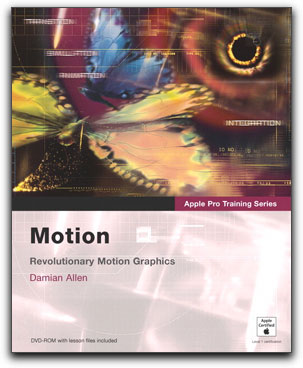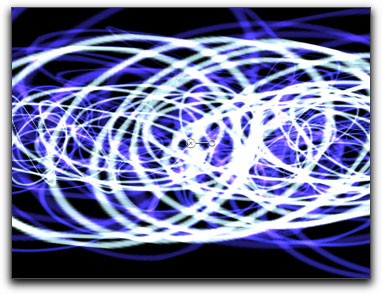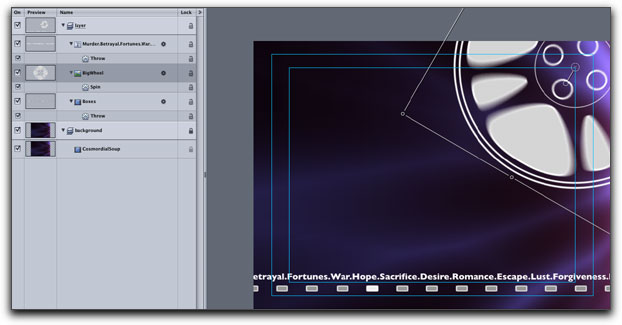
Review - Motion Tutorial 
November 29, 2004
Review - Motion: Apple Pro Training Series
Revolutionary Motion GraphicsWritten by Damian Allen
Published by PeachPit Press
ISBN 0-321-27826-7
List price: $44.99, Street price $30.59
544 pages - DVD-ROM lessons includedReview By Steve Douglas
This is the first major book on Motion to arrive within the Apple editing community and it is all I had been hoping it would be. In actuality, this book serves as the text for the Apple Motion Certification program and provides a thorough documentation of the many possibilities and levels that Motion has to offer. This is the book that should have accompanied Motion when it was purchased rather than the incomplete, non-manual supplied with the application.Each chapter is a lesson in itself exploring most of the many facets of Motion. Interestingly, in the beginning of each chapter is an annotative summary of what performance behaviors will be studied and how long the lesson should take to complete. At the end of each lesson is a short synopsis of what you have just learned. While it would certainly benefit the new user, and we are all new to Motion to varying degrees, to take one chapter at a time, there is no reason that one cannot skip the chapters/lessons that they already feel comfortable in and jump around through the book to their hearts content. The well-documented 14 chapters cover just about everything one needs to know in Motion. Included with the book is a DVD providing the many project folders' resource clips that one uses while working with this 'Classroom in a Text'. This material should be copied to the top (root) level of your hard drive so as to insure that the project files link with the media files they will use. The project media files contain 6.5 gigs of material and took about 20 minutes to complete the download using my 2Ghz G5 with 2 gigs of ram. That's a bit of a wait but it is well worth the time.
Revolutionary Motion Graphics starts out with a simple tour and exercises addressing the interface of Motion and proceeds from there with chapters/lessons on Using Generators, Working with Layers & Objects, Templates, Particles and Parameter Behaviors.
Combining simple particle abstract emitters and a cool gradient

can make for interesting effects.From there this book takes off the blinders enlightening us to the real power of Motions real-time graphics engine. That brings us to Lesson 6 where things got real interesting with lessons covering Advanced Particle Design, Using Blend Modes, Drawing Gestures, Keying, Text Effects and Integrating other Apple Pro Applications. In addition, there is also a section of Motion for After Effects Users as well.
Experimenting with Damian Allen's exercises is half the fun.

Here we used a slit scan filter, customized gradient and a cellular
generator. In real time it seems as if we hit warp speed 9.Some of the exercises are brief and to the point laying a foundation of experience, understanding and transitional skills to other lessons that enable you to create considerably larger projects. One is the creation of a sizable advertising promo which is really a cover for developing a more comprehensive understanding of working with layers in a different way than you might have experienced with After Effects or Photoshop.
Setting up the background layers using multiple media, layers, throws, spins, and text. Still more to do,

however, as you dig deeper into Motion while creating your advertising promoEach lesson is well focused on the intended purpose of the chapter. Mr. Allen frequently suggests at various points in each lesson that you stop there and experiment with different parameters. This encourages you to get the feel and fun of the program. He also repeatedly has you complete the same task using different methods, keyboard shortcuts and other helpful hints throughout.
One thing to be aware of is that some of the pictures in the book relating to exercises do not always match what you will produce. In lesson two, which reviews the use of the cellular generator and gradients in order to produce a 'Cosmordial Soup' effect, you will find that what you create bears little resemblance to the picture and movie file that comes within the book. This is just one that I was able to catch and there may or may not be others.
The book is both comprehensive and fun providing you with a myriad of insights, dozens of dazzling techniques, and useful tools that will certainly abbreviate your learning curve.
For me, this was not the book I wanted to skim through haphazardly. It is a full course meal to be eaten slowly and savored.
Steve Douglas is an underwater videographer and contributor to numerous film festivals around the world. A winner of the 1999 Pacific Coast Underwater Film Competition, 2003 IVIE competition, and the 2004 Los Angeles Underwater Photographic competition, Steve has also worked on the feature film "The Deep Blue Sea", recently contributed footage to the Seaworld parks for their new Atlantis production, and is one of the principal organizers of the San Diego UnderSea Film Exhibition. Steve leads both African safari and underwater filming expeditions with upcoming filming excursions to Thailand, Costa Rica, Kenya and Bali. Feel free to contact him if you are interested in joining him on any of these trips. www.worldfilmsandtravel.comReview copyright © Steve Douglas 2004
Purchase 'Motion: Apple Pro Training Series ' from the lafcpug store.
© 2000 -2004 Apple Computer, Inc. All rights reserved. Apple, the Apple logo, Final Cut Pro, Macintosh and Power Mac
are either registered trademarks or trademarks of Apple. Other company and product names may be trademarks of their respective owners.All screen captures, images, and textual references are the property and trademark of their creators/owners/publishers.